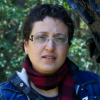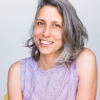In Memoriam

R’ada Massarwa
1978
-
2020

On September 5, 2020, R’ada Massarwa, a staff scientist in the laboratory of Prof. Benny Shilo, passed away after a long illness, at the young age of 42. R’ada was described as someone who had her own special way of seeing the world—an all-or-nothing person who lived in extremes. Her passion and tenacity was most evident in her exceptional work both in the lab and in the classroom.
Originally from the Israeli-Arab town of Baqua el Garbia, R’ada moved to Rehovot after high school to study at the Robert H. Smith Faculty of Agriculture at Hebrew University. In 2003, R’ada was accepted to the MSc/PhD program at the Weizmann Institute under the supervision of Prof. Shilo, in the Department of Molecular Genetics.
During her PhD studies, R’ada identified the regulatory protein WIP as a crucial element in muscle cell fusion in the fly embryo, and also characterized the role of the linear actin nucleator, Dia, in creating tracks for vesicle secretion in epithelial tissues in the fly embryo. These discoveries opened two new research areas that provided long-lasting research directions for the Shilo lab. For this work, she received the Kennedy Prize in 2009—the highest award for a PhD thesis at the Weizmann Institute.
“From the outset, it was clear that there was something special and unconventional about her,” says Prof. Shilo. “R’ada was a force of nature. Many times we did not agree, but it was still both challenging and fun to argue with her. Her uncompromising approach was also manifested in the courageous way with which she fought her illness over the past few years. She continued to come to the lab and actually regarded work as a welcome distraction to her medical problems.”
Known for pulling countless overnight shifts in the lab, R’ada not only possessed a unique work ethic, but was an outstanding budding scientist as well. She could process dozens of samples simultaneously, and obtain outstanding images on the confocal microscope.
After her PhD studies, she completed a postdoctoral fellowship in the lab of Prof. Lee Niswander in the Molecular Cellular & Developmental Biology Department at the University of Colorado. It was during her postdoctoral studies that R’ada decided to focus her career on research that would allow her to use her incredible technological talents to conduct challenging microscopy projects.
“R’ada was the most serious and hard-working student in the class,” recalls Prof. Niswander. “She was up at all hours, planning and doing experiments, and testing new ideas. She was passionate about her work and was a strong contributor to the learning of others in the course. But what I remember most is her smile. She was genuine in her interactions and I loved the twinkle in her eye during conversations. Her heart was warm and open.”
While at the University of Colorado, R’ada overcame every obstacle with an implacable perseverance. Though she was a chain-smoker, she gave up cigarettes completely to come to the smoke-free campus. When her right hand was injured, she became ambidextrous, training herself to use her left hand for highly exacting experiments.
Returning to the Weizmann Institute in 2012, R’ada worked in Prof. Yaqub Hanna’s lab in the Department of Molecular Genetics as an embryology and imaging expert. Her responsibilities included the handling of all microscopy instruments, training and assisting students and technicians, and designing a range of imaging experiments for the lab. In recent years, she returned to Prof. Shilo’s lab as a staff scientist, to continue research she began during her PhD studies.
In addition to science, R’ada was passionate about spreading science literacy to the younger generations, and organizing and teaching science workshops for Arab high school students and teachers. Her ambitious long-term plan, which she did not get a chance to implement, was to develop a large-scale scientific education and research program for high schools in the Arab sector.

Yael Mutsafi
1981
-
2019

Dr. Yael Mutsafi, who completed both her PhD and postdoctoral studies at the Weizmann Institute, tragically passed away from breast cancer on December 4, 2019, at the young age of 38. She left behind a husband and two young children.
Yael was described by her loved ones as a rare woman whose extraordinary intelligence was matched only by her boundless compassion.
“She had an amazing, almost frightening memory,” recalls her PhD thesis advisor, Prof. Avi Minsky. “She would quote studies she had read years before, and even remember the page number of the source—I couldn’t believe it. Not only did Yael have an extraordinary mind—she was extremely empathetic and cared very much about people.”
She grew up in Arad, in Israel’s Negev desert, and was fascinated by science from an early age. After receiving her bachelor’s degree in biology at the Tel Aviv University in 2005, she joined Prof. Minsky’s lab as an MSc student. It was not long before Prof. Minsky recognized her talent and suggested she switch to the direct MSc/PhD track. During that time, she studied the life cycle of the giant mimivirus to better understand how viruses penetrate and multiply in living cells. After completing her PhD, Yael pursued her first postdoctoral fellowship in Prof. Deborah Fass’s laboratory in the Department of Structural Biology where she used fluorescence and electron microscopy methods to study how the physical support system around cells, known as the extracellular matrix, assemble.
“Everything Yael did, she did intensely and deeply,” Prof. Fass remembers fondly. “She would dissect every seminar, every paper, every scientist we knew. She had an opinion about absolutely everything, expressed firmly but with grace and delicacy. I pull up her voice in my memory all the time because I loved so much to hear it.”
After completing her postdoctoral studies in Prof. Fass’s lab, Dr. Mutsafi received a Revson Fellowship in 2015 from the Israel National Postdoctoral Award Program for Advancing Women in Science managed by the Weizmann Institute, and moved with her family to Bethesda, Maryland, where both she and her husband both worked as postdoctoral fellows at the National Institutes of Health (NIH). Shortly after she joined the NIH, she was diagnosed with an aggressive form of breast cancer. After multiple treatments, she went through a brief remission period, but the cancer returned.
“When everyone recalls memories of her, they always talk about how intelligent and kind she was,” her husband, Daniel, says. “To me, her unique perspective on everyday things—a painting, a book, a person—her seeing something that no one else noticed and sharing these insights with me made life with her so interesting. Our children and I miss the privilege of her love, her softness, her tolerance and acceptance, and her support and power.”
She is survived by Daniel and their two children, Nadav and Shai, as well as her siblings, Michal, Noa, and Omer, and her parents, Yossi and Yaffa.
